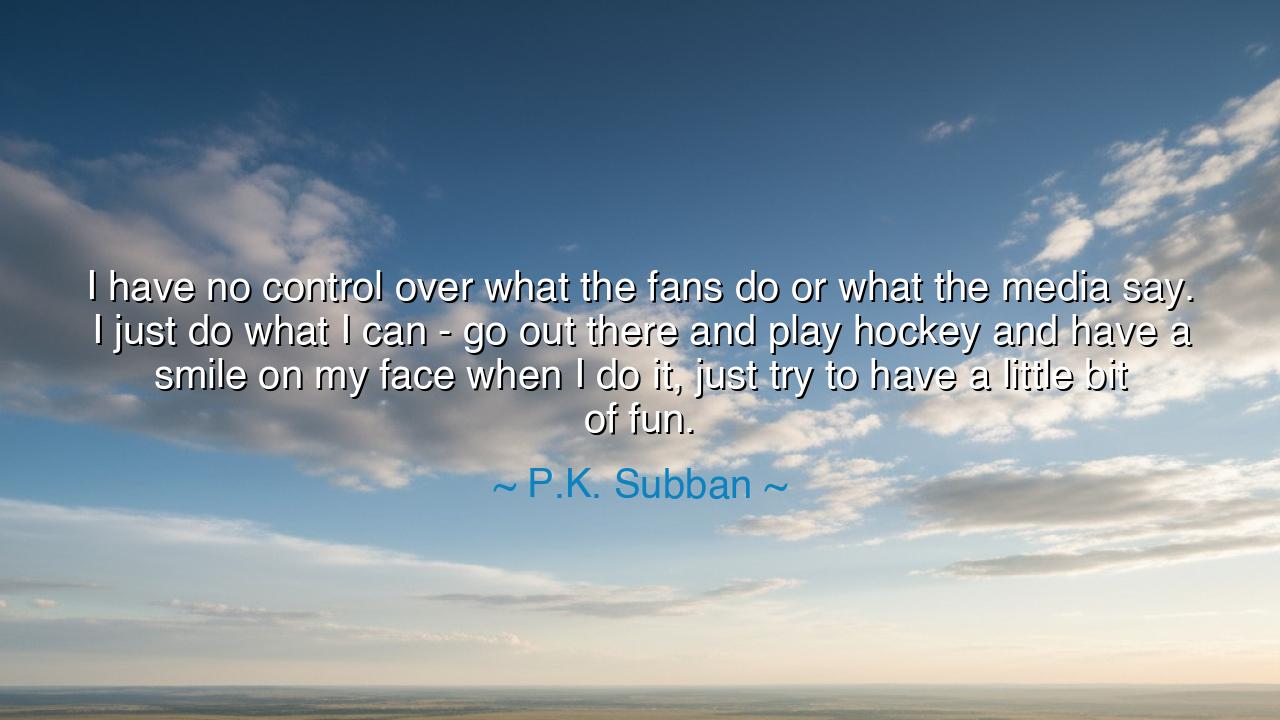
I have no control over what the fans do or what the media say. I
I have no control over what the fans do or what the media say. I just do what I can - go out there and play hockey and have a smile on my face when I do it, just try to have a little bit of fun.






The words of P.K. Subban resound with the wisdom of humility and joy: “I have no control over what the fans do or what the media say. I just do what I can—go out there and play hockey and have a smile on my face when I do it, just try to have a little bit of fun.” At first, they appear to be the words of an athlete shrugging off the weight of fame. Yet within them lies a teaching that spans beyond the rink and into the very heart of life: the art of distinguishing what is within our power from what lies beyond it, and the courage to meet our tasks with smiles and fun, even in the midst of storms.
The meaning here is rooted in the ancient principle of acceptance. Subban reminds us that no man, no matter how skilled or celebrated, can command the voices of the crowd or the pens of the press. To live for their approval is to place one’s happiness in chains. But to focus only on what lies within one’s grasp—the effort, the discipline, the joy of the game—this is to live freely. In this way, Subban is kin to the Stoic philosophers who taught: “Control what is yours to control; release what is not.”
Consider the tale of Marcus Aurelius, emperor of Rome. Surrounded by whispers, betrayals, and judgments from his people, he could not govern their opinions, only his own actions. In his Meditations, he wrote of meeting each day’s duties with calm and with dignity, never allowing the noise of others to master him. Subban, in his own way, walks this same path: he does not try to silence the critics or shape the fans’ every cheer, but instead carries himself into the arena with focus and with joy.
Yet in Subban’s words there is more than resignation; there is also the spirit of play. He does not say, “I endure it.” He says, “I smile and have a little fun.” This is not merely acceptance but transformation. It is the recognition that life, even in its trials, can be met with lightness. To smile in the midst of scrutiny is to claim victory over bitterness. To laugh while laboring is to turn duty into celebration. Thus Subban teaches us that joy is not naïve—it is heroic.
This wisdom finds its origin in the essence of sport itself. Before the stadiums, before the cameras, children played for the sheer delight of motion, of chasing a puck, of scoring a goal. The purity of the game was not in trophies or in headlines, but in fun. Subban, though lifted to fame, seeks to hold onto this original spirit, reminding us that the heart of any craft is joy. Without joy, the work becomes hollow; with it, even hardship becomes light.
The lesson for us is clear: do not live for the voices of others. You cannot control their cheers nor their criticisms. You can only control your effort, your heart, and the way you choose to meet each day. In practice, this means releasing the weight of constant comparison, focusing on the task before you, and carrying into it the joy that first drew you to it. Whether in work, in study, in art, or in play, let your face carry the smile that proves you remember why you began.
Thus, let these words of P.K. Subban endure as a teaching for generations: life will always bring its spectators, its critics, its distractions. Pay them no more heed than passing winds. Instead, give yourself wholly to your calling. Do it with effort, with courage, and above all with joy. For if you can smile while you labor, if you can find fun even in the struggle, then you have already won the greater victory—one that no media nor fan can ever take away.






AAdministratorAdministrator
Welcome, honored guests. Please leave a comment, we will respond soon